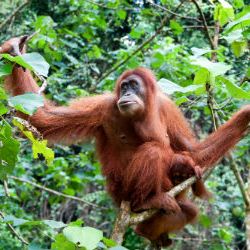World Orangutan Day – 10 Amazing Orangutan Facts

World Orangutan Day was celebrated on the 19th August so to mark the occasion we have put together 10 great orangutan facts.
Amazing Orangutan Facts
- The name orangutan means ‘Person of the Forest’ and is derived from the Malay words orang, meaning “man”, and hutan, meaning “forest”.
- There are three species of orangutan: Borneo, Sumatran and Tepanuli. All are critically endangered.
- They are great apes not monkeys. Other great apes include chimpanzees, gorillas, bonobos and humans.
- Orangutans are the largest tree dwelling animals in the world.
- There are over 400 food items that orangutans love to eat. Their diet consists mainly of plants and plant parts (fruit, seeds, bark, leaves and flowers), but sometimes insects, eggs, birds and small mammals are also eaten.
- They are highly intelligent and can use tools for moe than just foraging and nest building. In Borneo they have been observed using tools to aid acoustic communication. It is believed that this is done to fool listeners in to thinking they are larger than they are.
- They have an enormous arm span. The outstretched arms of mature adults can reach up to 8ft. Their long arms make them well suited to tree living and suspending themselves from branches to eat.
- When male orangutans reach maturity they develop large cheek pads which females are thought to find attractive.
- Orangutans have opposable thumbs just like humans, however they also have opposable big toes!
- They have a slow maturity. For the first 4-6 years of life an infant will hold on tight to its mother as she moves though the forest.
Threat of Extinction
Sadly these fantastic animals face extinction in the next 10 years. They are critically endangered. Greenpeace has estimated that their population falls by 25 every day due to habitat destruction. Their rainforest home is destroyed for logging, palm oil plantations and mining. We need to act fast to save these beautiful creatures.
To find out how you can support orangutans please visit our Adopt an Orangutan page.



